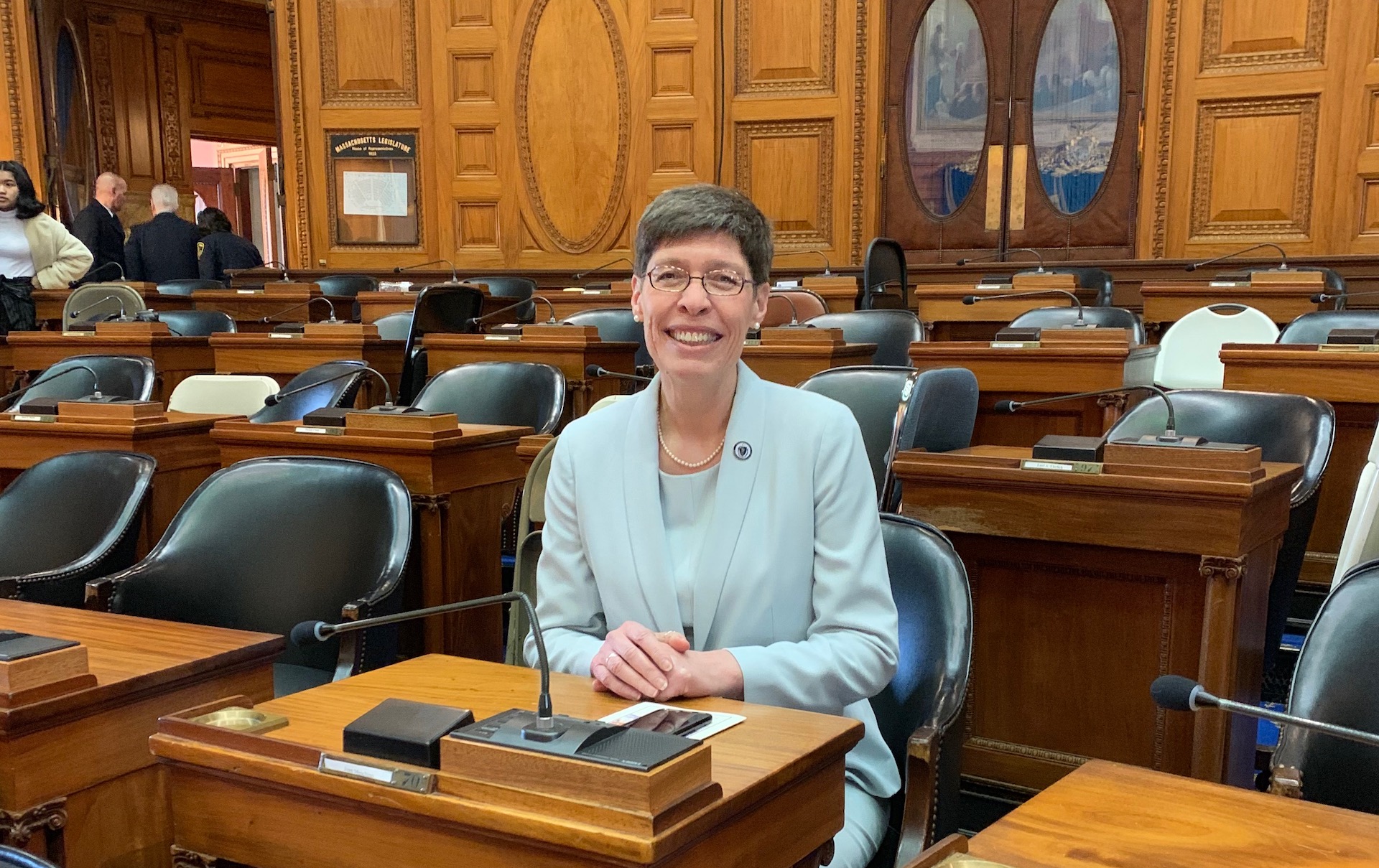With the passage of its Next Generation Climate bills in January 2020, the Massachusetts Senate laid out its vision for comprehensive climate policy this session. Attention has now shifted to the House of Representatives, which is feeling increased pressure to pass similar climate change legislation. The climate policy landscape has shifted dramatically since last session, and there is a unique opportunity for substantial climate action in the House before the end of 2020.
At the center of this opportunity is one specific bill: Representative Meschino’s 2050 Roadmap bill.
A Roadmap to where?
A lifelong resident of the coastal town of Hull, Massachusetts, Representative Joan Meschino has always kept climate change and its impacts top of mind throughout her public career. Speaking to Climate XChange on why this is important for Hull and other towns, Rep. Meschino said, “as coastal communities, we experience the dynamic, and often dramatic, effects of coastal inundation, frequent high intensity storms and extreme temperatures. As a result, we expend significant dollars in offshore protection, public safety and adaptation, and resilience measures.”
In 2016, when she first ran for State Representative, she counted protecting her hometown from climate impacts and combating the root causes climate change as her top priorities. After running for re-election in 2018, Meschino drafted, and ultimately filed the ‘2050 Roadmap Bill’ (H.832). The motivation behind doing so, according to Rep. Meschino, is that “Massachusetts has been on the forefront of climate and clean energy for over a decade; yet, it is urgent that we press forward to make progress. By creating a concrete, comprehensive plan to combat climate change, we can ensure a clean and thriving Massachusetts economy.”
The legislation can trace its history back to the Global Warming Solutions Implementation Act (GWSIA), a bill first filed by former Representative Frank Smizik in 2017. The GWSIA sought an update of the state’s emissions reduction goals to include legally binding targets for 2030 and 2040. Known as ‘intermediate targets,’ these goals would join existing ones for 2020 and help to ensure the state met its eventual 2050 goal of 80% reductions.
Rep. Meschino took the GWSIA bill, and the update to the state’s emissions targets, and ran with it. She ultimately built from its foundation a bill that includes carbon pricing, a state-wide goal of net zero by 2050, and new oversight of the state’s implementation of climate policy.
As it is currently written, the core parts of the bill include:
- Economy-wide net-zero: Makes the 2050 state-wide emissions limit stronger by replacing the current goal of 80% below 1990 levels to net-zero.
- Intermediate emissions targets: Creates new intermediate emissions targets of 50% reduction by 2030, and 75% by 2040.
- Authorizes carbon pricing: Specifically authorizes the Governor to enact carbon pricing, which opens the door for the current or future Governor to include a fee-and-rebate program.
- More robust reporting: Requires the Governor to develop an emissions reduction ‘roadmap’ plan every two and a half years, instead of every five. The plan is required to detail each source of GHGs and how it will be reduced to meet the 2050 net-zero mandate. Each roadmap must include proposed policies, regulations, and legislative recommendations. It also requires another annual report quantitatively assessing the effectiveness of regulations and programs at reducing GHG emissions.
- Inclusion requirement for environmental justice, low income communities: In promulgating new regulations, the Governor is required to take into account the impact on low and moderate income and environmental justice populations.
Additional provisions
- Eliminates the current 2020 sunsets in regulations for declining emissions levels.
- Requires the Governor to conduct and publish an analysis of Massachusetts’ energy economy and emissions in a regional context by 2020.
- Updates definitions in state law of ‘direct emissions,’ ‘indirect emissions,’ ‘market-based compliance mechanism,’ and ‘greenhouse gas-emitting priority.’
- Removes the loophole that has previously allowed municipal light plants from not complying with state emissions reductions requirements.
A Roadmap to success
The Roadmap bill is currently in a very unique position in the Massachusetts House, and has a real chance of passing this session. For one, it enjoys a level of support from House members that is unusually cross-factional, with both progressive caucus members and more traditionally cautious House leaders supporting it.
In early 2019, the House Progressive Caucus voted it in as one of its top three legislative priorities for the session to come. In fact, it received the most votes of any bill considered by the caucus for endorsement. Expanding on this, Representative Tricia Farley-Bouvier, Co-Chair of the House Progressive Caucus, explained to Climate XChange, “the [Roadmap] bill saw so much support from Caucus members because it’s comprehensive, and establishes benchmarks to encourage responsible action and create accountability around meeting the Commonwealth’s climate action goals.” Building on this, Representative Jack Lewis, the other Co-Chair of the Progressive Caucus, added, “At the same time, it’s a proposal that members thought could get broad consensus in the House. We are hearing from our communities about the climate change impacts they are facing, and it’s time for us to respond and take real action.”
At the same time, there have been reports throughout the session that House Speaker DeLeo and other House leaders are supportive of the bill and the approach it takes on climate action. The bill complements a bill passed by the House earlier in the session, Speaker DeLeo’s Greenworks bill, which primarily focuses on providing new resources for communities to proactively address climate impacts. When you overlay this all with the list of lawmaker cosponsors (59 in total, which includes members of both parties), and backing from a wide swath of the environmental community, you have a formula for legislative success.
That was even before the Governor surprised all by publicly including a net-zero by 2050 goal in his annual State of the Commonwealth. Although details on how Governor Baker plans to achieve this remain sparse, the announcement itself has had ripple effects through Beacon Hill. Immediately after his address, reporters asked Senate President Spilka and Speaker DeLeo if they supported the Governor’s net zero target. President Spilka said yes, and went on to explain that a similar goal was in the Senate’s climate bill (which it was). Speaker DeLeo also said he was supportive of trying to achieve net zero emissions, and that he hoped to get a bill done this session.
This immediately boosted the 2050 Roadmap bill’s prospects. The bill remains the only one in the House that shares the Governor’s new goal of net zero by 2050.
A Roadmap to common ground with the Senate
In a sense the Senate’s recent action on climate policy further boosts the Meschino Roadmap bill.
In January 2020 the Senate introduced a series of bills (dubbed the ‘Next Generation Climate’ package) that include a net-zero emissions goal by 2050, requirements for an economy-wide carbon price, and the creation of a new independent climate oversight commission, among other things. The Senate then rapidly accepted amendments (over 150 of them) and set about voting on the bills before the end of January. The Senate was ultimately successful in passing these bills, which have now been sent over to the House for their consideration. The House can either take up the Senate bills, and make changes as they go, or (more likely) pass their own House-originated versions. Either way, if both chambers pass similar bills they will meet in a special ‘conference committee’ to negotiate differences and agree on a final bill.
The Roadmap bill is to the House, as the Next Generation Climate bill is to the Senate. It’s the House’s comprehensive climate bill in the current session. It has large amounts of support among all levels of the House, both rank-and-file and leadership. It matches the Governor’s new net-zero goal. It also keeps the House from being accused of sitting idle while climate activists demand action, and the Governor and Senate make progress in addressing climate change.
Yes, the Roadmap bill has room to be expanded and refined, but it offers a chance if passed for the Senate and the House to sit down and agree upon an approach to net zero emissions, among other climate actions. Further, because of its inclusion of carbon pricing and new reporting structures, the Roadmap bill opens the door for the House to consider key parts of the Senate climate bills. Specifically, its mandate of an economy-wide carbon pricing by 2030 and the establishment of a Climate Policy Commission could be under consideration.
Of course, the landscape for climate policy is likely to continue shifting between now and the end of July (the deadline for action this session). You can keep up to date on the latest developments, and get original news & analysis directly to your inbox, by subscribing to the Climate XChange Policy Roundup.









